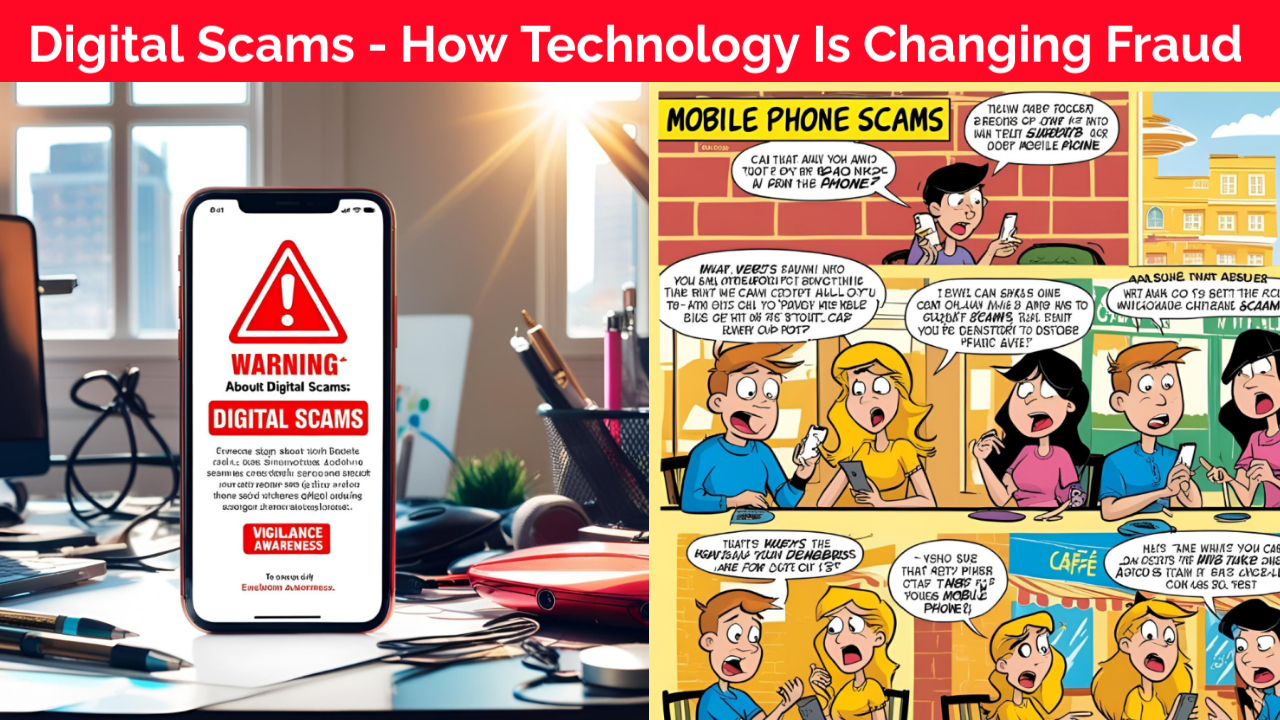Online and Digital Scams happening when fraudster’s people use the internet to trick people for getting the personal information or sending money and using personal information for blackmailing. These Digital Scams often come in the form of Phone Call, SMS, Phishing Emails, Fake Digital Scams Websites and Fake Email Id, or Fraudulent Online Shopping Schemes.

Types of Digital Scams for Online Fraud in 2025
| Type of Scam | Description |
|---|---|
| Deepfake Impersonation | AI-Generated fake videos or voices scam. |
| AI Phishing | AI-written emails users into revealing sensitive data. |
| Crypto Scams | Fake investment platforms on cryptocurrency. |
| Romance Scams | Fake romantic relationships to extract money from victims. |
| SIM Swap | Hijacking of mobile numbers to access and control user accounts. |
| Fake Job Offers | Fraudulent job ads request upfront fees. |
| QR Code Scams | QR codes to redirect for steal data. |
| Fake Government Sites | Fake official Govt. Portals to collect private information. |
| BEC Attacks | Business email compromise for fraudulent financial transactions. |
| Shopping Scams | Fake e-commerce websites that accept payment without delivering goods. |
Also Read: 5 Tips to Stay Healthy During Summer – Stay Healthy This Summer
How to Avoid Tech-Enabled Digital Scams
To Avoid Tech-Enabled Digital Scams regularly update your Mobile Phone, Computer and Laptop Operating System Software to help protect against cyber security/Digital Scams. Enable bio-metrics such as facial recognition and fingerprint scanners on personal devices. If you get any unknown number call, pop-up message, email from tech support, ignore it immediately. These are the best defense from the Digital Scams or Online Fraud.
How to Aware From Ransomware Attacks and Online Phishing Scams
It is important for all people to understand Digital Scams how dangers behind both ransomware attacks and phishing scams. A ransomware attack begins with a malware infection on the victim’s operating system (Computer, Laptop and Mobile etc.), often through phishing emails, compromised websites, and fake software. Ransomware attacks are dangerous for governments and businesses, as they can disrupt critical services data, compromise sensitive data, and result data in significant financial and reputation damage.
A phishing scam comes in type of cyber-attack where attackers stole user sensitive information, such as usernames, passwords, credit card numbers, or other personal data, by masquerading as a trustworthy entity in electronic communications through digital scams.
How to Avoid from Mobile Phone Scams
To Avoid from Mobile Phone Scams DO NOT provide any personal data or payment details over the Phone Call, SMS or any other Chatting Apps. It is also recommended to avoid unknown calls and SMS and entertain any unknown service provider that tries to sell services or offer to you on phone call. This type of call may be the mobile phone call scams. Further, update yourself with proper information regarding from government or bank how to protect yourself from Mobile Phone Scams/Smartphone fraud attempts and the different types of mobile scams.
Government Helpline Number for Digital Scam
If you have already lost money due to financial fraud/digital scam or are a victim of cyber-crime, report at cyber crime helpline number 1930 or website https://www.cybercrime.gov.in. Chakshu facility does not handle financial fraud or cyber-crime cases.
Conclusion
Digital scams are rapidly evolving with technology, especially through AI, deepfakes, phishing, and impersonation tactics. Individuals and businesses you must stay vigilant, update their systems, avoid unknown communication sources, and be informed about scam prevention strategies. Reporting fraud promptly to official cybercrime platforms is essential in curbing these threats.
FAQ (Frequently Asked Questions)
What is a digital scam?
A digital scam is an online fraud attempt to steal personal data or money using the internet or technology.
How do scammers use technology in 2025?
Scammers use AI, deepfakes, fake job offers, phishing emails, and government impersonation to deceive victims.
How to protect myself from online fraud?
Keep your devices updated, enable biometric security, and ignore suspicious emails, calls, and messages.
What should we do if I’m scammed online?
Report it immediately to the cybercrime helpline at 1930 or visit cybercrime.gov.in.
How to avoid mobile phone scams?
Never share personal details via phone or SMS, and avoid interacting with unknown callers or services.




Nice information